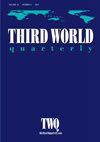Oceanic diplomacy and foreign-policy making in Tuvalu: a values-based approach
IF 1.8
2区 经济学
Q2 DEVELOPMENT STUDIES
引用次数: 0
Abstract
AbstractRecently, scholars of the Pacific region have discussed the concept of Oceanic diplomacy. Oceanic diplomacy focuses on diplomatic practices or principles that belong to Pacific cultures and are distinct from but sometimes work in concert with Western diplomatic practices. The goal of exploring Oceanic diplomacy is examining the current value of these practices and principles, whether within a single country, among Pacific nations, or at the global level. Here, I apply Oceanic diplomacy in analysing Tuvalu’s 2020 Foreign Policy: Te Sikulagi (The Horizon). I first examine the main cultural concepts highlighted in Te Sikulagi – falepili (being a good neighbour) and kaitasi (shared ownership) – and how they function within traditional Tuvaluan diplomacy. I next examine how, after the publication of Te Sikulagi, these concepts were earmarked for use in bolstering relations with other Pacific nations as part of Western or ‘conventional’ diplomatic practices (i.e. signing diplomatic relations). Finally, I outline how these concepts are utilised at the global level in Tuvalu’s activism on climate change. To conclude, I discuss not only how Oceanic diplomacy demonstrates the existence of diplomacies outside the Western diplomatic paradigm but also how these culturally distinctive and antecedent diplomacies are increasingly influencing global diplomatic trends.Keywords: Oceanic diplomacyPacific regionTuvaluforeign-policy making2020 Tuvalu foreign policy: Te Sikulagi Disclosure statementThe author reports there are no competing interests to declare.Ethical approvalEthical approval for interviews in this research was provided by Victoria University of Wellington’s Human Ethics Committee (Approval No. 23599). Informed consent was derived via signed informed consent forms.Notes1 Ethical approval for interviews in this research was provided by Victoria University of Wellington’s Human Ethics Committee (Approval No. 23599). Informed consent was derived via signed informed consent forms.2 The other countries are Vietnam, St. Kitts and Nevis, Gabon, the Bahamas, Kosovo, and St. Lucia.Additional informationFundingPart of this work was supported by Victoria University of Wellington under Grants 214491 and 221469.Notes on contributorsJess MarinaccioJess Marinaccio is Assistant Professor of Asian Pacific studies at California State University, Dominguez Hills, and was recently employed in Tuvalu’s Foreign Affairs Department. She received her doctorate in Pacific studies from Victoria University of Wellington and researches Pacific understandings of diplomacy. She has published in The Contemporary Pacific.图瓦卢的海洋外交和外交政策制定:基于价值观的方法
摘要近年来,太平洋地区学者对海洋外交的概念进行了探讨。海洋外交侧重于属于太平洋文化的外交实践或原则,与西方外交实践不同,但有时也与西方外交实践相协调。探索大洋外交的目的是检查这些做法和原则的当前价值,无论是在一个国家内,在太平洋国家之间,还是在全球层面。在这里,我运用海洋外交来分析图瓦卢2020年的外交政策:The Sikulagi(地平线)。我首先考察了《图瓦卢外交》中强调的主要文化概念——falepili(睦邻友好)和kaitasi(共同拥有)——以及它们在图瓦卢传统外交中的作用。接下来,我将研究在Te Sikulagi出版后,这些概念如何被指定用于加强与其他太平洋国家的关系,作为西方或“传统”外交实践的一部分(即签署外交关系)。最后,我将概述这些概念如何在图瓦卢应对气候变化的行动中在全球层面上得到应用。最后,我不仅讨论了大洋外交如何展示了西方外交范式之外外交的存在,还讨论了这些具有文化特色和先导性的外交如何日益影响全球外交趋势。关键词:大洋外交太平洋地区图瓦卢外交政策制定2020图瓦卢外交政策:锡库拉吉披露声明作者报告无利益冲突需要申报。本研究中访谈的伦理批准由惠灵顿维多利亚大学人类伦理委员会(批准号23599)提供。通过签署知情同意书获得知情同意。注1本研究访谈的伦理批准由惠灵顿维多利亚大学人类伦理委员会提供(批准号23599)。通过签署知情同意书获得知情同意其他国家是越南、圣基茨和尼维斯、加蓬、巴哈马、科索沃和圣卢西亚。本研究得到惠灵顿维多利亚大学214491和221469基金的部分资助。作者简介jess Marinaccio,加州州立大学多明格斯山分校亚太研究助理教授,最近受聘于图瓦卢外交部。她在惠灵顿维多利亚大学获得太平洋研究博士学位,研究太平洋地区对外交的理解。她曾在《当代太平洋》上发表文章。
本文章由计算机程序翻译,如有差异,请以英文原文为准。
求助全文
约1分钟内获得全文
求助全文
来源期刊

Third World Quarterly
DEVELOPMENT STUDIES-
CiteScore
4.10
自引率
15.00%
发文量
137
期刊介绍:
Third World Quarterly ( TWQ ) is the leading journal of scholarship and policy in the field of international studies. For almost four decades it has set the agenda of the global debate on development discourses. As the most influential academic journal covering the emerging worlds, TWQ is at the forefront of analysis and commentary on fundamental issues of global concern. TWQ examines all the issues that affect the many Third Worlds and is not averse to publishing provocative and exploratory articles, especially if they have the merit of opening up emerging areas of research that have not been given sufficient attention. TWQ is a peer-reviewed journal that looks beyond strict "development studies", providing an alternative and over-arching reflective analysis of micro-economic and grassroot efforts of development practitioners and planners. It furnishes expert insight into crucial issues before they impinge upon global media attention. TWQ acts as an almanac linking the academic terrains of the various contemporary area studies - African, Asian, Latin American and Middle Eastern - in an interdisciplinary manner with the publication of informative, innovative and investigative articles. Contributions are rigorously assessed by regional experts.
 求助内容:
求助内容: 应助结果提醒方式:
应助结果提醒方式:


